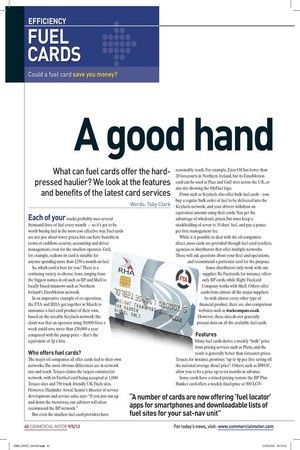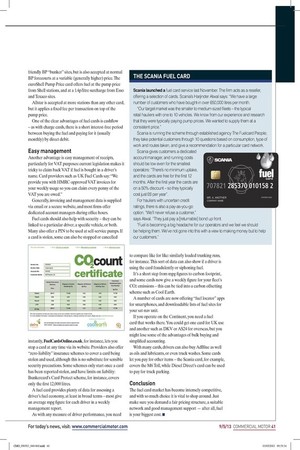A good hand What can fuel cards offer the hardpressed
Page 31

Page 32

If you've noticed an error in this article please click here to report it so we can fix it.
haulier? We look at the features and benefits of the latest card services Words: Toby Clark Each of your trucks probably uses several thousand litres of fuel every month — so it's got to be worth buying fuel in the most cost-effective way. Fuel cards are not just about lower prices, but can have benefits in So, which card is best for you? There is a confusing variety to choose from, ranging from the biggest names in oil such as BP and Shell to locally based minnows such as Northern Ireland's EmoMotion network.
In an impressive example of co-operation, the FTA and RHA got together in March to announce a fuel-card product of their own, based on the sizeable Keyfuels network: the claim was that an operator using 30,000 litres a week could save more than £50,000 a year compared with the pump price — that's the equivalent of 3p a litre.
Who offers fuel cards?
The major oil companies all offer cards tied to their own networks. The most obvious differences are in network size and reach. Texaco claims the largest commercial network, with its Fastfuel card being accepted at 1,000 Texaco sites and 750 truck-friendly UK Fuels sites. However, Harjinder Atwal, Scania's director of service development and service sales, says: "If you just run up and down the motorway, our advisers will often recommend the BP network."
But even the smallest fuel-card providers have reasonable reach. For example, Emo Oil has fewer than 20 forecourts in Northern Ireland, but its EmoMotion card can be used at Pace and Gulf sites across the UK, or any site showing the MyFuel logo.
Firms such as Keyfuels also offer bulk fuel cards — you buy a regular bulk order of fuel to be delivered into the Keyfuels network, and your drivers withdraw an equivalent amount using their cards. You get the advantage of wholesale prices, but must keep a stockholding of seven to 10 days' fuel, and pay a penceper-litre management fee.
While it is possible to deal with the oil companies direct, most cards are provided through fuel-card resellers, agencies or distributors that offer multiple networks. These will ask questions about your fleet and operations, and recommend a particular card for the purpose. Some distributors only work with one supplier: Be Fuelcards, for instance, offers only BP cards, while Right Fuelcard Company works with Shell. Others offer cards from almost all the major suppliers. As with almost every other type of financial product, there are also comparison websites such as trackcompare.co.uk. However, these sites do not generally present data on all the available fuel cards.
Features Many fuel cards derive a weekly "bulk" price from pricing services such as Platts, and the result is generally better than forecourt prices. Texaco, for instance, promises "up to 4p per litre saving off the national average diesel price". Others, such as BWOC, allow you to fix a price up to six months in advance.
Some cards have a mixed pricing system: the BP Plus Bunker card offers a weekly fixed price at 500 LGV friendly BP "bunker" sites, but is also accepted at normal BP forecourts at a variable (generally higher) price. The euroShell Pump Price card offers fuel at the pump price from Shell stations, and at a 1.4p/litre surcharge from Esso and Texaco sites.
Allstar is accepted at more stations than any other card, but it applies a fixed fee per transaction on top of the pump price.
One of the clear advantages of fuel cards is cashflow — as with charge cards, there is a short interest-free period between buying the fuel and paying for it (usually monthly) by direct debit.
Easy management Another advantage is easy management of receipts, particularly for VAT purposes: current legislation makes it tricky to claim back VAT if fuel is bought in a driver's name. Card providers such as UK Fuel Cards say: "We provide you with HMRC-approved VAT invoices for your weekly usage so you can claim every penny of the VAT you are owed."
Generally, invoicing and management data is supplied via email or a secure website, and most firms offer dedicated account managers during office hours.
Fuel cards should also help with security — they can be linked to a particular driver, a specific vehicle, or both. Many also offer a PIN to be used at self-service pumps. If a card is stolen, some can also be stopped or cancelled instantly, FuelCardsOnline.co.uk, for instance, lets you stop a card at any time via its website. Providers also offer "zero-liability" insurance schemes to cover a card being stolen and used, although this is no substitute for sensible security precautions. Some schemes only start once a card has been reported stolen, and have limits on liability: Bunkercard's Card Protect scheme, for instance, covers only the first 12,000 litres.
A fuel card provides plenty of data for assessing a driver's fuel economy, at least in broad terms — most give an average mpg figure for each driver in a weekly management report.
As with any measure of driver performance, you need to compare like for like: similarly loaded trunking runs, for instance. This sort of data can also show if a driver is using the card fraudulently or siphoning fuel.
It's a short step from mpg figures to carbon footprint, and some cards now give a weekly figure for your fleet's CO2 emissions — this can be tied into a carbon offsetting scheme such as Cool Earth.
A number of cards are now offering "fuel locator" apps for smartphones, and downloadable lists of fuel sites for your sat-nay unit.
If you operate on the Continent, you need a fuel card that works there. You could get one card for UK use and another such as DKV or A524 for overseas, but you might lose some of the advantages of bulk buying and simplified accounting.
With many cards, drivers can also buy AdBlue as well as oils and lubricants, or even truck washes. Some cards let you pay for other items — the Scania card, for example, covers the M6 Toll, while Diesel Direct's card can be used to pay for truck parking.
Conclusion The fuel card market has become intensely competitive, and with so much choice it is vital to shop around. Just make sure you demand a fair pricing structure, a suitable network and good management support — after all, fuel is your biggest cost. • THE SCANIA FUEL CARD Scania launched a fuel card service last November. The firm acts as a reseller, offering a selection of cards. Scania's Harjinder Atwal says: "We have a large number of customers who have bought-in over 650,000 litres per month.
"Our target market was the smaller to medium-sized fleets —the typical retail hauliers with one to 10 vehicles. We know from our experience and research that they were typically paying pump prices. We wanted to supply them at a consistent price."
Scania is running the scheme through established agency The Fuelcard People; they take potential customers through 10 questions based on consumption, type of work and routes taken, and give a recommendation for a particular card network.
Scania gives customers a dedicated account manager, and running costs should be low even for the smallest operators: "There's no minimum uptake, and the cards are free for the first 12 months. After the first year the cards are on a 50% discount — so they typically cost just £6 per year".
For hauliers with uncertain credit ratings, there is also a pay-as-you-go option. "We'll never refuse a customer," says Atwal. "They just pay a [returnable] bond up front.
"Fuel is becoming a big headache for our operators and we feel we should be helping them. We've not gone into this with a view to making money but to help our customers."



















































